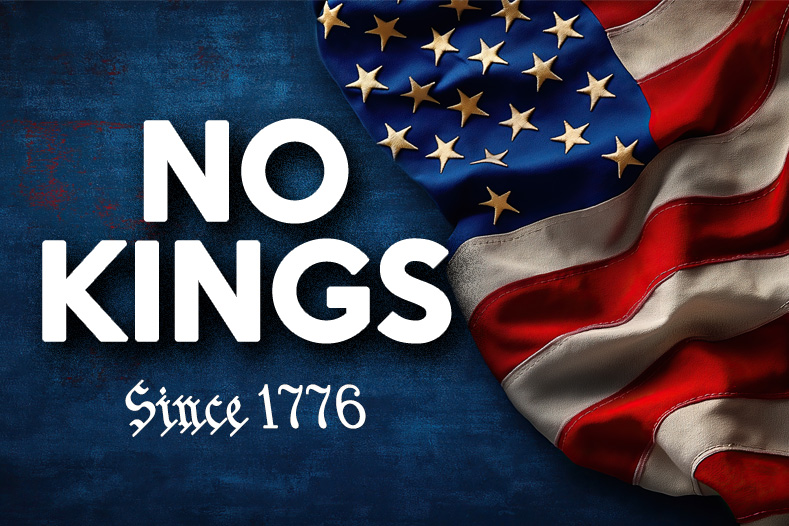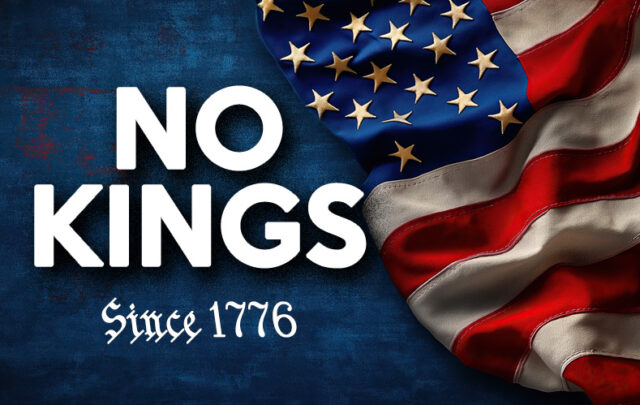On June 14th, the Trump Administration has planned a military parade in Washington DC on the 250th anniversary of the founding of the United States Army (which also happens to be the president’s birthday). Many in the US will be simultaneously participating in pro-democracy protests that are being called “No Kings Day.”
It comes just a few weeks before July 4th, when the United States celebrates its founding in a rebellion against the British monarchy nearly 250 years ago. While “No Kings Day” isn’t a national holiday, its sentiment is as American as the revolution that began it.
But this time the king-to-be is not an overseas monarch but a creeping authoritarian decades in the making.
On the Human Nature Odyssey podcast, I’ve been exploring the long arc of the global struggle between monarchy and revolution, authoritarianism and democracy, hierarchy and equality—from the storming of the Bastille to the rise of fascism, from communist revolutions to neoliberal collapse. It’s a three-part audio series called The King Is Dead, Now What?
We released Part 1 last month. You can listen or read the transcript here.
Part 2 drops on June 26th.
The goal of the series is to explore some of the events, ideologies, and political battles that have brought us to this current, history-shaping moment. And ultimately better understand the present, avoid past mistakes, seek common ground across divides, and chart a new way forward.
It’s a crucial time to consider this history—not as something confined to the past but as unfolding today.
It all started during the French Revolution.
250 years ago, most of Europe was ruled by kings. Monarchies were the norm—and had been so since the fall of the Roman Empire.
Medieval Europeans knew that the ancient Roman republic elected members of a senate and parts of ancient Greece had something called a democracy, but to most, that was just ancient history.
In the 16th and 17th centuries, Europeans came in contact with Native American nations, like the Haudenosaunee (or Iroquois Confederacy) whose elected representatives made decisions collectively and were free from absolute rulers. Most Europeans found this very odd. But Europe was changing. And over a couple centuries, the European mindset slowly started to shift.
In 1762 French philosopher Jean-Jacques Rousseau came to believe that freedom was natural and monarchy was not. “Man is born free,” he famously wrote, “but everywhere he is in chains.”
A couple years later, Denis Diderot put it a little more bluntly: “Man will never be free until the last king is strangled with the entrails of the last priest.”
Then came 1789. Inspired by these changing ideas, the example set by those rebellious former British colonies recently named the United States, and widespread suffering, many in France had had enough. A mob stormed the Bastille, peasants burned their official feudal contracts, and thousands of Parisian women marched on the Palace of Versailles.
To avert further chaos, a National Assembly was… assembled. Clergy, nobles, and wealthy commoners debated what should be done. Two camps emerged: those in favor of a king and those in favor of revolution. The first group sat on the right wing of the assembly room and the latter sat on the left wing. That’s where we get the terms “right wing” and “left wing.”
At its core, this was a clash between hierarchy and egalitarianism, between authoritarianism and democracy.
This debate sparked by the French Revolution soon spread across Europe and the colonies it controlled.
But even the ideologies that championed egalitarianism struggled to live up to the vision.
For example, after the Russian Revolution of 1917, the left-wing Bolshevik party declared Russia a communist state. But despite its claimed commitment to economic and social equality, the new Soviet Union was a far cry from that ideal. The political elite lived in luxury while the masses struggled to get by. Stalin criminalized homosexuality, enforced widespread deportations of ethnic minorities, and promoted traditional gender roles. Abortion was banned, and women were largely excluded from positions of power.
Before long, the nascent Soviet Union looked an awful lot like the conservative dictatorship that its revolution had tried to escape.
Funny how a society of peasants and tsars ultimately creates another version of peasants and tsars. Every teenager thinks they’re gonna reinvent the world—until they turn into their parents.
World War I dealt a serious blow to monarchism. The 500-year-old Ottoman Empire was dissolved. The Austro-Hungarian Empire collapsed. And Germany’s Kaiser Wilhelm abdicated, ending the short-lived German Empire.
Though monarchism was on the decline, those on the now worldwide right-wing still believed top-down authoritarianism was necessary for an efficient and orderly society.
I think of fascism as monarchy 2.0: same dictatorial power—just without the long lineage to back it up. Remember: Hitler called Nazi Germany the “Thousand Year Reich.” That was his plan. Sure, it’s new now but wait one thousand years when there’s Adolf the 16th. Then the difference between monarchy and fascism starts to blur.
But even though monarchy and fascism suffered defeats in the two world wars, the appeal of top-down rule persisted.
While the Soviet Union claimed to champion egalitarianism but failed to deliver on that promise, the United States has faced similar contradictions in its commitment to democracy. Even when U.S. presidents acted in authoritarian ways, they still paid lip service to the ideals of freedom and democratic governance. When the George W. Bush Administration passed the Patriot Act, opened the Guantanamo Bay detention camp, and expanded executive power, it justified these moves as necessary to defend liberty and the so-called free world.
Increasingly prominent blogger Curtis Yarvin has called for an American monarchy. Tucker Carlson, during a 2024 campaign speech for the current president, likened the strongman leader we need to a stern father willing to give their misbehaving kids a good spanking.
After the more than two centuries since the American and French Revolutions, the kings are back—or at least, trying to be. It seems we’re finding ourselves completing some sort of strange cycle. But we don’t have to be stuck in it. We can learn from what’s happened here. Is it possible to create a more equal and free society that’s better for everyone?
As the great unraveling continues to unravel, and the polycrisis disrupts all aspects of social, economic, and political life, I imagine the temptation for strongmen with easy answers will only grow.
Supporters imagine these leaders as having the best vantage point—uniquely positioned to make swift, effective decisions. But in reality, autocrats surround themselves with yes-men. Their perspective narrows, and governance begins to resemble little more than the desire to power.
We’re often told that while democracy is perhaps a more just system, it’s also a less efficient one.
But is democracy inherently flawed? Or have neoliberal democracies just been corrupted—by money, corporate influence, and systemic decay?
A well-functioning democracy that allows for the greatest perspectives, resolves political conflicts peacefully, and is more adaptable and dynamic, may prove more effective than authoritarianism ever could. Especially as we face unprecedented challenges in human history.
While the term ‘democracy’ comes from the Greeks, the phenomenon exists far beyond them. Many indigenous societies have long governed through representative councils or direct assemblies. There are countless ways to do democracy—even many we have yet to explore.
What happens next will have to be told by us. Where will we go next?
To dig deeper into this history—and what it means for our future—I hope you’ll join us for The King Is Dead, Now What?, a three-part audio series from Human Nature Odyssey.
You can click here to start listening to part one.





